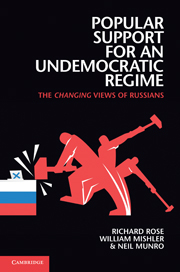Book contents
- Frontmatter
- Contents
- List of figures
- List of tables
- Introduction: The need for popular support
- 1 Democratic and undemocratic models of support
- 2 Changing the supply of regimes
- 3 Putin consolidates a new regime
- 4 Increasing support for an undemocratic regime
- 5 Individual influences on regime support
- 6 Time tells: there is no alternative
- 7 Finessing the challenge of succession
- 8 The challenge of economic reversal
- 9 Maintaining a regime – democratic or otherwise
- Appendix A New Russia Barometer samples
- Appendix B Coding of variables
- References
- Index
6 - Time tells: there is no alternative
Published online by Cambridge University Press: 05 June 2012
- Frontmatter
- Contents
- List of figures
- List of tables
- Introduction: The need for popular support
- 1 Democratic and undemocratic models of support
- 2 Changing the supply of regimes
- 3 Putin consolidates a new regime
- 4 Increasing support for an undemocratic regime
- 5 Individual influences on regime support
- 6 Time tells: there is no alternative
- 7 Finessing the challenge of succession
- 8 The challenge of economic reversal
- 9 Maintaining a regime – democratic or otherwise
- Appendix A New Russia Barometer samples
- Appendix B Coding of variables
- References
- Index
Summary
Support for a regime is never static, as is implied by theories of democratic consolidation. The appearance of stability is caused by a regime being in equilibrium; the tension created by political forces pushing and pulling in different directions holds support at a particular point (Young, 1998). Thus, a change in a single influence will affect the overall equilibrium. If other forces adapt, the net effect is that aggregate support will appear steady as opposing forces continue to cancel each other out. However, substantial changes in determinants of support create a dynamic challenge to an equilibrium. In a democratic political system, challenges can take the form of a new political party emerging. In an undemocratic system, challenge can involve the demand for regime change.
Since society is constantly in flux, the longer the passage of time, the less realistic it is to expect that the influences that substantially affect regime support will remain unchanged or cancel each other out. For those in charge of a regime, anything that increases support for the current regime will be welcomed, while anything likely to decrease support will sound political alarm bells. Even if small, a change in regime support can capture political attention and encourage political commentators to extrapolate a trend. A shock event, such as an armed Chechen band holding schoolchildren as hostages, may temporarily alter the level of regime support.
- Type
- Chapter
- Information
- Popular Support for an Undemocratic RegimeThe Changing Views of Russians, pp. 104 - 123Publisher: Cambridge University PressPrint publication year: 2011

